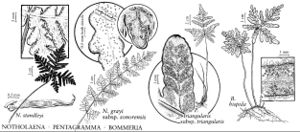Difference between revisions of "Bommeria hispida"
Bull. Torrey Bot. Club 29: 633. 1902.
FNA>Volume Importer |
imported>Volume Importer |
||
| (6 intermediate revisions by 2 users not shown) | |||
| Line 7: | Line 7: | ||
|year=1902 | |year=1902 | ||
}} | }} | ||
| − | |basionyms={{Treatment/ID/ | + | |special_status={{Treatment/ID/Special_status |
| + | |code=F | ||
| + | |label=Illustrated | ||
| + | }} | ||
| + | |basionyms={{Treatment/ID/Basionym | ||
|name=Gymnogramma hispida | |name=Gymnogramma hispida | ||
|authority=Kuhn | |authority=Kuhn | ||
| + | |rank=species | ||
| + | |publication_title=Linnaea | ||
| + | |publication_place=36: 72. 1869 | ||
}} | }} | ||
|synonyms={{Treatment/ID/Synonym | |synonyms={{Treatment/ID/Synonym | ||
|name=Bommeria schnafferi | |name=Bommeria schnafferi | ||
|authority=E. Fournier | |authority=E. Fournier | ||
| − | }}{{Treatment/ID/Synonym | + | |rank=species |
| + | }} {{Treatment/ID/Synonym | ||
|name=Gymnogramma ehrenbergiana var. muralis | |name=Gymnogramma ehrenbergiana var. muralis | ||
|authority=Pringle ex Davenport | |authority=Pringle ex Davenport | ||
| − | }}{{Treatment/ID/Synonym | + | |rank=variety |
| + | }} {{Treatment/ID/Synonym | ||
|name=Gymnopteris hispida | |name=Gymnopteris hispida | ||
|authority=(Kuhn) L. Underwood | |authority=(Kuhn) L. Underwood | ||
| + | |rank=species | ||
}} | }} | ||
|hierarchy=Pteridaceae;Bommeria;Bommeria hispida | |hierarchy=Pteridaceae;Bommeria;Bommeria hispida | ||
| Line 35: | Line 45: | ||
|elevation=1000–2500 m | |elevation=1000–2500 m | ||
|distribution=Ariz.;N.Mex.;Tex.;Mexico. | |distribution=Ariz.;N.Mex.;Tex.;Mexico. | ||
| − | |discussion=<p>Bommeria hispida is the only member of this genus to occur north of Mexico. It is the most morphologically distinct species in the genus, having a relatively small leaf size, dissected segments, and copious and diverse leaf indument. Natural hybrids involving B. hispida are unknown. The pedate blade shape, lack of colored farina abaxially, and presence of both needlelike and coiled trichomes abaxially serve to distinguish this species from sympatric members of Cheilanthes, Notholaena, and Pentagramma.</p><!-- | + | |discussion=<p><i>Bommeria hispida</i> is the only member of this genus to occur north of Mexico. It is the most morphologically distinct species in the genus, having a relatively small leaf size, dissected segments, and copious and diverse leaf indument. Natural hybrids involving <i>B. hispida</i> are unknown. The pedate blade shape, lack of colored farina abaxially, and presence of both needlelike and coiled trichomes abaxially serve to distinguish this species from sympatric members of <i>Cheilanthes</i>, <i>Notholaena</i>, and <i>Pentagramma</i>.</p><!-- |
| − | --><p>Reports of Bommeria hispida in California (C. H. Haufler 1979) are based on old specimens with questionable locality data.</p> | + | --><p>Reports of <i>Bommeria hispida</i> in California (C. H. Haufler 1979) are based on old specimens with questionable locality data.</p> |
|tables= | |tables= | ||
|references= | |references= | ||
| Line 45: | Line 55: | ||
-->{{#Taxon: | -->{{#Taxon: | ||
name=Bommeria hispida | name=Bommeria hispida | ||
| − | |||
|authority=(Kuhn) L. Underwood | |authority=(Kuhn) L. Underwood | ||
|rank=species | |rank=species | ||
| Line 59: | Line 68: | ||
|publication title=Bull. Torrey Bot. Club | |publication title=Bull. Torrey Bot. Club | ||
|publication year=1902 | |publication year=1902 | ||
| − | |special status= | + | |special status=Illustrated |
| − | |source xml=https:// | + | |source xml=https://bitbucket.org/aafc-mbb/fna-data-curation/src/2e0870ddd59836b60bcf96646a41e87ea5a5943a/coarse_grained_fna_xml/V2/V2_310.xml |
|genus=Bommeria | |genus=Bommeria | ||
|species=Bommeria hispida | |species=Bommeria hispida | ||
Latest revision as of 20:22, 5 November 2020
Stems long-creeping and often branched. Leaves arising at 7–10 mm intervals. Petiole generally rounded (but distally grooved in some large leaves); indument of scales proximally, of scales and trichomes distally, central portion generally glabrous. Blade 1–7 cm, about as long as wide; ultimate segments rounded at apex; abaxial indument of scales (commonly with 10+ cells across base), unicellular needlelike trichomes (0.75–1.12 mm), and unicellular coiled trichomes (ca. 1–2 mm); adaxial indument of unicellular needlelike hairs 0.47–1.11 mm, arising from unspecialized basal cells; rachis chestnut brown. Veins free. Sporangia covering 2/3–3/4 distance from margin of blade to costa of each ultimate segment. Spores 64 per sporangium; perispore surface crested. 2n = 60.
Phenology: Sporulating summer–fall.
Habitat: At bases of large boulders on dry to moist slopes, primarily in mountainous, xeric regions, occasionally forming large mats
Elevation: 1000–2500 m
Distribution

Ariz., N.Mex., Tex., Mexico.
Discussion
Bommeria hispida is the only member of this genus to occur north of Mexico. It is the most morphologically distinct species in the genus, having a relatively small leaf size, dissected segments, and copious and diverse leaf indument. Natural hybrids involving B. hispida are unknown. The pedate blade shape, lack of colored farina abaxially, and presence of both needlelike and coiled trichomes abaxially serve to distinguish this species from sympatric members of Cheilanthes, Notholaena, and Pentagramma.
Reports of Bommeria hispida in California (C. H. Haufler 1979) are based on old specimens with questionable locality data.
Selected References
None.
